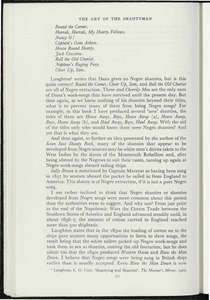titel ( Shanty Nederland )
049 Shanties From The Seven Seas

Shanties From The Seven Seas, Round The Corner
Titel:
Shanties From The Seven Seas
Ondertitel:
Round The Corner
Naam uitgever:
MYSTIC SEAPORT MUSEUM
Jaar van uitgave:
First Published 1961
Omschrijving:
Liedtekst
Taal:
Engels
Aantal pagina's:
430
Paginanummer:
36
Plaats van uitgave:
Connecticut
Auteur:
Collected by Stan Hugill
Organisatie: Shanty Nederland
laatste wijziging 14-02-2023
1 gedigitaliseerd

 Mijn Studiezaal (inloggen)
Mijn Studiezaal (inloggen)
